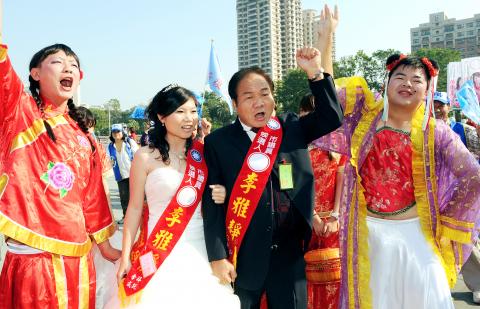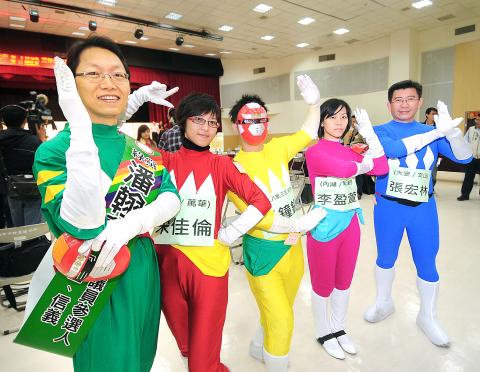Campaigns for the Nov. 27 special municipality elections shifted up a gear yesterday as election hopefuls drew numbers to decide their numerical designations in the elections.
In an obvious attempt to leave voters with a strong impression, as well as seeking an auspicious start, several candidates opted to show up at the drawing in costumes, with some dressed up as Power Rangers, brides, a fairy and a soldier.
Taichung Mayor Jason Hu (胡志強) of the Chinese Nationalist Party (KMT), seeking re-election, came decked out as a “Chilean miner” in reference to the miners who were rescued earlier this month after being trapped underground for 69 days.

Photo: CNA
Hu’s attire drew objections from Hung Heng-chu (洪恆珠), the wife of his Democratic Progressive Party (DPP) counterpart, Su Jia-chyuan (蘇嘉全), who questioned Hu’s identity because his appearance did not match the pictures on his identification card.
RESPECT

Photo: Chang Chung-yi, Taipei Times
Saying that the drawing should proceed in a serious manner, Su also said Hu lacked respect for the occasion by making such changes to his appearance.
Pointing to Hu’s “miner” helmet, which bore the words “Council of Labor Affairs,” Su also questioned whether there had been a violation of administrative neutrality.
Hu, who dressed up as operatic tenor Luciano Pavarotti in the candidate number drawing for the Taichung mayoral election in 2005, said his Chilean miner look yesterday signified that he would bring residents of Greater Taichung out of difficulties and toward a brighter future.

Photo: Fang Pin-chao, Taipei Times
After failing to quell Hung’s doubts, Taichung City Election Commission director Huang Chung-sheng (黃仲生) drew the number on Hu’s behalf.
Hu got No. 2 and Su was No. 1.
In Taipei City, Taipei Mayor and KMT candidate Hau Lung-bin (郝龍斌) attended the lot-drawing event at the Taipei Election Commission and drew No. 2, attracting a wave of cheers from KMT Taipei City councilor candidates, who chanted “Victory for No. 2, Taipei Fly High.”
“Four years ago, I stood here and promised to carry out my campaign platforms and I did. In the next four years, I will also live up to my words ... I devoted my efforts to developing Taipei in the last four years and I call on Taipei residents to give me another four years to work for them,” said Hau, surrounded by party councilors and supporters.
SCUFFLE
Before arriving at the commission, Hau and his campaign team staff were confronted by DPP Taipei City council candidate Tung Chung-yen (童仲彥), who pushed the group causing abrasions to two of Hau’s campaign staff workers.
Hau’s campaign spokesman Fan Chiang Tai-chi (范姜泰基) later accused Tung of violence, and said the camp would not tolerate any forms of violence during the election campaign.
DPP Taipei mayoral candidate Su Tseng-chang (蘇貞昌), meanwhile, yesterday chose to skip the lot-drawing and instead inspected a municipal monument on Xining N Road.
“The lot drawing is nothing but a ritual, and Taipei residents do not care about what number I get. What they care about is who will do better work for the city,” he said.
Staff of the commission office drew the number on Su’s behalf, drawing the No. 5. DPP Taipei City councilors cheered the result, and shouted “victories for five special municipalities,” while KMT Taipei City councilors shouted “Bottom of the race!”
Another three candidates in the Taipei mayoral race were independent Wu Yen-cheng (吳炎成), Hsiao Shu-hua (蕭淑華) and Wu Wu-ming (吳武明), who were No. 1, No. 3 and No. 4 respectively.
In Taipei County, which will be renamed Sinbei City after it is upgraded to a special municipality in December, representatives for the KMT’s Sinbei mayoral candidate Eric Chu (朱立倫) and Tsai Ing-wen (蔡英文) from the DPP drew No. 1 and No. 2 respectively.
Both parties attempted to play up their selection following the ceremony, with an official at Chu’s campaign immediately saying that the No. 1 fit perfectly with the candidate’s most common trademark, one thumb up.
“He had a feeling that [one] would be chosen, as when he talks, he commonly uses the thumbs up sign,” said Chiang Cheng-yan (江政彥), a manager at his campaign office. “We would have been worried if we picked No. 2.”
His campaign team immediately thought up a slogan: “Chu is No. 1, he will definitely win,” a play on the word “definitely,” which in Chinese partly contains the character for “one.”
Sending two of her spokespersons to select her number, Tsai also expressed satisfaction with the result, saying that the No. 2 represented that she was on the “second” stage to victory.
It showed that her campaign was slowly and steadily inching its way forward before Nov. 27, she added.
Both spokespersons Luo Chih-cheng (羅致政) and Cheng Li-chiun (鄭麗君) immediately gave the victory sign following the choice and said it was a good number because not only did it represent success, but also “a doubling of happiness … which is what Tsai aims to give Sinbei City residents.”
“This number will bring Tsai a lot of confidence in this final month,” Cheng said.
In Greater Kaohsiung, KMT Secretary-General King Pu-tsung (金溥聰) and Legislative Speaker Wang Jin-pyng (王金平) accompanied the party’s Kaohsiung -mayoral -candidate Huang Chao-shun (黃昭順) to draw lots. She made a “V” sign hand gesture for victory in the election after drawing No. 2.
Kaohsiung County Commissioner Yang Chiu-hsing (楊秋興), who is running the election as an independent candidate after withdrawing from the DPP in August, got No. 1 in the number drawing, while incumbent Mayor Chen Chu (陳菊) of the DPP got No. 3
In Greater Tainan, the KMT’s Kuo Tien-tsai (郭添財) was No. 1 and the DPP’s William Lai (賴清德) drew No. 2.
Additional reporting by Rich Chang and CNA

MORE VISITORS: The Tourism Administration said that it is seeing positive prospects in its efforts to expand the tourism market in North America and Europe Taiwan has been ranked as the cheapest place in the world to travel to this year, based on a list recommended by NerdWallet. The San Francisco-based personal finance company said that Taiwan topped the list of 16 nations it chose for budget travelers because US tourists do not need visas and travelers can easily have a good meal for less than US$10. A bus ride in Taipei costs just under US$0.50, while subway rides start at US$0.60, the firm said, adding that public transportation in Taiwan is easy to navigate. The firm also called Taiwan a “food lover’s paradise,” citing inexpensive breakfast stalls

TRADE: A mandatory declaration of origin for manufactured goods bound for the US is to take effect on May 7 to block China from exploiting Taiwan’s trade channels All products manufactured in Taiwan and exported to the US must include a signed declaration of origin starting on May 7, the Bureau of Foreign Trade announced yesterday. US President Donald Trump on April 2 imposed a 32 percent tariff on imports from Taiwan, but one week later announced a 90-day pause on its implementation. However, a universal 10 percent tariff was immediately applied to most imports from around the world. On April 12, the Trump administration further exempted computers, smartphones and semiconductors from the new tariffs. In response, President William Lai’s (賴清德) administration has introduced a series of countermeasures to support affected

CROSS-STRAIT: The vast majority of Taiwanese support maintaining the ‘status quo,’ while concern is rising about Beijing’s influence operations More than eight out of 10 Taiwanese reject Beijing’s “one country, two systems” framework for cross-strait relations, according to a survey released by the Mainland Affairs Council (MAC) on Thursday. The MAC’s latest quarterly survey found that 84.4 percent of respondents opposed Beijing’s “one country, two systems” formula for handling cross-strait relations — a figure consistent with past polling. Over the past three years, opposition to the framework has remained high, ranging from a low of 83.6 percent in April 2023 to a peak of 89.6 percent in April last year. In the most recent poll, 82.5 percent also rejected China’s

PLUGGING HOLES: The amendments would bring the legislation in line with systems found in other countries such as Japan and the US, Legislator Chen Kuan-ting said Democratic Progressive Party (DPP) Legislator Chen Kuan-ting (陳冠廷) has proposed amending national security legislation amid a spate of espionage cases. Potential gaps in security vetting procedures for personnel with access to sensitive information prompted him to propose the amendments, which would introduce changes to Article 14 of the Classified National Security Information Protection Act (國家機密保護法), Chen said yesterday. The proposal, which aims to enhance interagency vetting procedures and reduce the risk of classified information leaks, would establish a comprehensive security clearance system in Taiwan, he said. The amendment would require character and loyalty checks for civil servants and intelligence personnel prior to